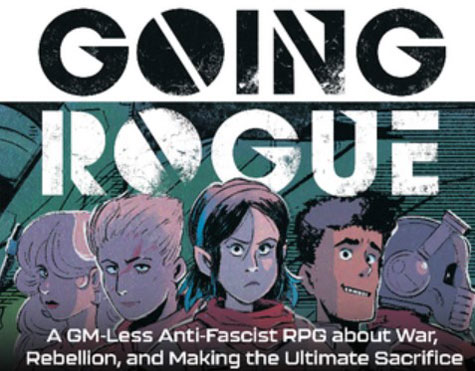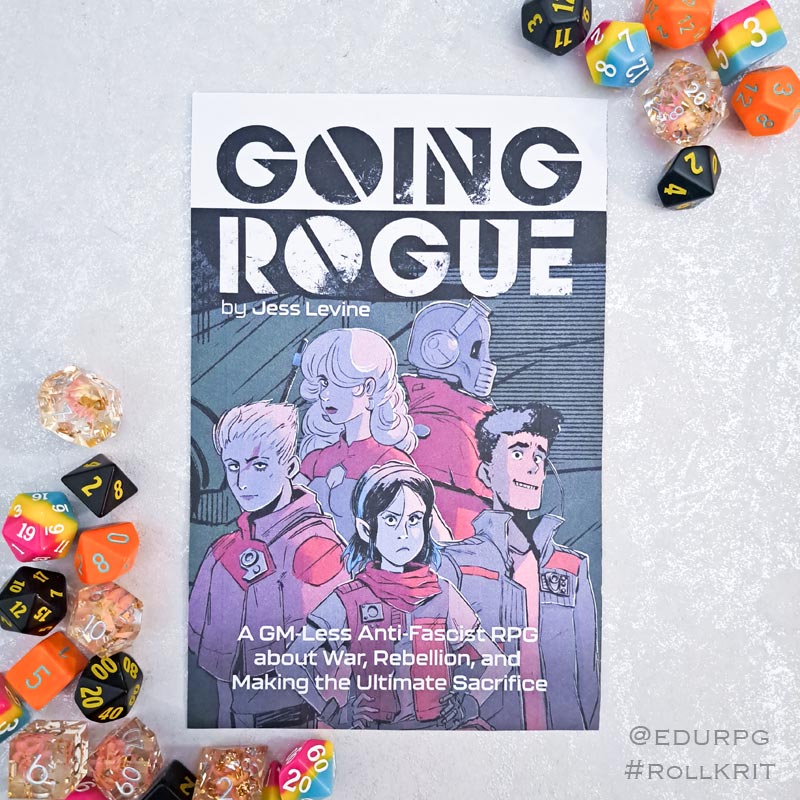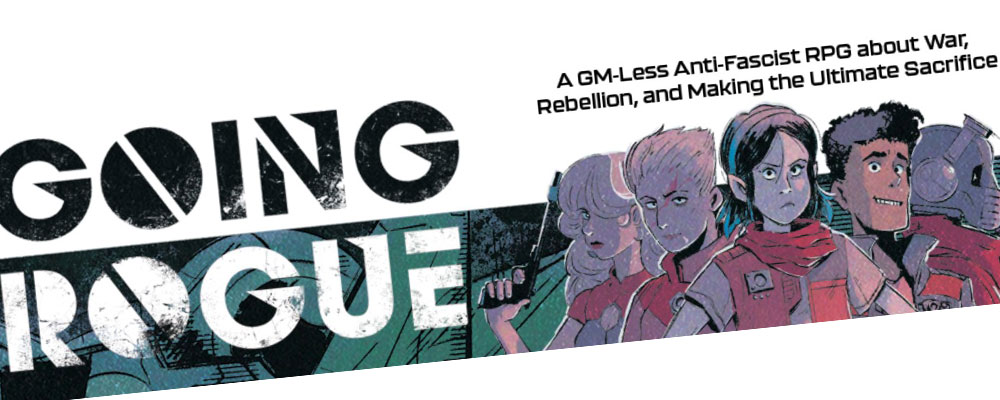Dieser Blogbeitrag ist Teil der Reihe #RollKRIT (Rollenspiele zum Kampf gegen Rechtsextremismus durch Förderung von Inklusion und Toleranz). english below
Teil 5 Going Rogue
In Teil 4 dieser Serie schrieb ich, dass Rebel Scum und thematisch ähnliche TTRPGs mit leichtgewichtigen Regelsystemen durchaus edukativ gezielt eingesetzt werden können, um etwa Aspekte wie Autoritarismus, Gruppenzwang und Zivilcourage zu thematisieren.
Going Rogue ist ein Beispiel für einen solchen thematisch ähnlichen Ansatz: Die Autorin Jess Levine nutzt dazu ebenfalls einen an das Star Wars Universum angelehnten Hintergrund für die Spielwelt und das resultierende Regelwerk ist mit gerade mal 34 Seiten sogar noch kürzer als Rebel Scum – die Spielsysteme der beiden TTRPGs unterscheidet sich dagegen deutlich.
Belonging Outside Belonging
Going Rogue nutzt das Belonging Outside Belonging System. Es handelt sich dabei um einen kollaborativ-erzählerischen Ansatz für Tabletop-Rollenspiele, der auf Würfel und Zahlenwerte für Charakterfähigkeiten verzichtet. Er wurde ursprünglich von Avery Alder und Benjamin Rosenbaum für Dream Askew und Dream Apart entwickelt und ermöglicht eine Aufteilung der Spielleitungsfunktionen unter den Spielenden. Oft wird es als Spiel ohne Spielleitung bezeichnet – man kann es aber auch als ein Spiel beschreiben, bei dem jeder Spielende Aspekte der Spielleitung übernimmt. Im Verlauf des Spiels können Spielende etwa ihre Umgebung beschreiben, Nicht-Spieler-Charaktere darstellen und die Konsequenzen von Handlungen erzählen.
Token als Erzählressource
Dabei werden Token als eine Ressource zur Steuerung von starken und schwachen Moves genutzt. Alle SCs verfügen über eine Liste von starken Moves, die positive oder kontrollierte Aktionen darstellen, sowie von schwachen Moves, die riskant oder problematisch sind, den Spielenden aber einen Token zurückgeben. Mit anderen Worten: Um einen starken Move auszuführen, muss man einen Token ausgeben, den man zuvor durch einen schwachen Move verdient hat.
Dieses System ist optimiert, um Geschichten über Gemeinschaften am Rand der Gesellschaft zu erzählen. Die Spielcharaktere stehen dabei oft im Spannungsfeld zwischen Zugehörigkeit und Außenseitertum. Sie erzählen emotionale, soziale und persönliche Geschichten, die etwa in post-apokalyptischen Gemeinschaften (Dream Askew) oder jüdischen Fantasy-Welten (Dream Apart) spielen. Oder eben in diesem Fall in einem Setting, das an das Star Wars Universum angelehnt ist – wobei insbesondere Rogue One und Andor als Vorbilder genutzt wurden. Das Spiel legt den Fokus auf die oft unbeachteten Helden des Widerstands, die im Schatten agieren und immense Opfer bringen, um Tyrannei zu bekämpfen.
Rebel Scum oder Going Rogue
Während der Fokus bei Rebel Scum stärker auf einem schnellen, actionreichen Spielgefühl liegt, ermutigt die Mechanik von Going Rogue die Spielenden mit Hilfe der tokenbasierten Vorgehensweise, den Fokus auf eine gemeinsame narrative Gestaltung zu legen. Andererseits verlangen die ungewöhnlicheren Regelelemente von Going Rogue möglicherweise zunächst eine Eingewöhnungszeit, die nicht bei allen Spielgruppen gewünscht bzw. in allen pädagogischen Situationen möglich ist. Somit sprechen die Spiele unterschiedliche Spielstile, Vorlieben und Voraussetzungen an.
Die Autorin bezeichnet Going Rogue ausdrücklich als antifaschistisches Rollenspiel über Krieg, Rebellion und ultimative Aufopferung. Durch die immersive Erzählweise und die Betonung von Charakterentwicklung ermöglicht dieses TTRPG die Komplexität von moralischen Entscheidungen zu erleben. Wie zahlreiche andere TTRPGs kann es gezielt pädagogisch genutzt werden, um Empathie und kritisches Denken zu fördern, sowie dabei helfen, Mechanismen von Radikalisierung, Gruppenzwang und moralischer Entscheidungsfindung nachvollziehen. Es lohnt sich meiner Meinung nach sehr, das einmal selbst auszuprobieren.
Erhältlichkeit
Das Spiel ist z.B. bei itch.io und bei DrivethruRPG erhältlich.

This Blog Post is Part of the #RollKRIT Series („Roll Dice to Knockdown Radicalism with Inclusiveness & Tolerance“).
Part 4 Going Rogue
In Part 4 of this series, I wrote that Rebel Scum and thematically similar TTRPGs with lightweight rule systems can be deliberately used for educational purposes, for example, to address aspects such as authoritarianism, peer pressure, and civil courage.
Going Rogue is an example of such a thematically similar approach: Author Jess Levine also uses a setting inspired by the Star Wars universe for the game world, and the resulting rulebook, at just 34 pages, is even shorter than Rebel Scum. However, the game systems of the two TTRPGs differ significantly.
Belonging Outside Belonging
Going Rogue utilizes the Belonging Outside Belonging system. This is a collaborative, narrative-driven approach to tabletop role-playing games that forgoes dice and numerical character stats. Originally developed by Avery Alder and Benjamin Rosenbaum for Dream Askew and Dream Apart, it allows the distribution of game-mastering functions among the players. It is often described as a game without a game master – but it can also be seen as a game where each player takes on aspects of game mastering. Throughout the game, players can describe their surroundings, portray non-player characters, and narrate the consequences of actions.
Tokens as a Narrative Resource
Tokens are used as a resource to regulate strong and weak moves. All player characters (PCs) have a list of strong moves, which represent positive or controlled actions, as well as vulnerable moves, which are risky or problematic but reward the player with a token. In other words: To perform a strong move, a player must spend a token that they previously earned through a vulnerable move.
This system is optimized for telling stories about communities on the fringes of society. The player characters are often caught between belonging and being outsiders. They tell emotional, social, and personal stories, such as those set in post-apocalyptic communities (Dream Askew) or Jewish fantasy worlds (Dream Apart). In this case, the setting is inspired by the Star Wars universe, particularly taking Rogue One and Andor as its main influences. The game focuses on the often-overlooked heroes of the resistance who operate in the shadows and make immense sacrifices to fight tyranny.
Rebel Scum or Going Rogue
While Rebel Scum places more emphasis on a fast-paced, action-packed gaming experience, Going Rogue’s token-based mechanics encourage players to focus on collective narrative development. On the other hand, Going Rogue’s more unconventional rule elements may require an adjustment period, which may not be desirable or feasible for all gaming groups or educational settings. As a result, the two games cater to different play styles, preferences, and requirements.
The author explicitly describes Going Rogue as an anti-fascist role-playing game about war, rebellion, and ultimate sacrifice. Through its immersive storytelling and emphasis on character development, this TTRPG allows players to experience the complexity of moral decision-making. Like many other TTRPGs, it can be purposefully used in educational contexts to foster empathy and critical thinking, as well as to help players understand mechanisms of radicalization, peer pressure, and moral dilemmas. In my opinion, it is well worth trying out for yourself.
Availability
The game is available at itch.io and DrivethruRPG.

